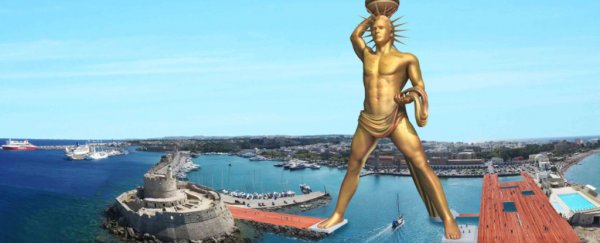Until an earthquake in 226 BCE knocked it down, the Colossus of Rhodes, a 30-metre-high iron and bronze statue of the Greek god Helios, sat near the harbour of Rhodes, Greece, for 54 years.
Now, a plan put forth by a small team of scientists seeks to rebuild the ancient statue and boost tourism and local jobs in the process.
 A rendering of the 400-foot Colossus of Rhodes reboot. Credit: Colossus of Rhodes
A rendering of the 400-foot Colossus of Rhodes reboot. Credit: Colossus of Rhodes
The plan calls for a new statue that's way taller than the ancient one. At 122 metres tall, the new Helios would be nearly four times the height of the original. The proposal also includes an interior library, museum, cultural centre, exhibition hall, and, of course, a crowning lighthouse that's visible for 56 kilometres.
One obvious change to the new structure is that it would use modern construction techniques and technology to make it earthquake-proof. The exterior would be completely covered in golden solar panels, making it entirely self-sufficient, which is appropriate for the Greek god of the sun.
 A museum inside the statue would display ancient Greek treasures currently stored away. Credit: Colossus of Rhodes
A museum inside the statue would display ancient Greek treasures currently stored away. Credit: Colossus of Rhodes
It's estimated that the project can be completed in three to four years at a cost of 240 to 260 millions euros (US$264 to US$286 million). Funding is expected to come from cultural institutions and international crowdfunding.
In addition to renewing and extending Greece's tourism season, the statue's construction would bring much-needed jobs. Whether or not this will all come together depends on how much support and money the team behind the plan can raise. No construction dates have been released.
 A view of the statue's lighthouse, which would glow for up to 35 miles. Credit: Colossus of Rhodes
A view of the statue's lighthouse, which would glow for up to 35 miles. Credit: Colossus of Rhodes
 A museum and library are among the interior plans for the statue. Credit: Colossus of Rhodes
A museum and library are among the interior plans for the statue. Credit: Colossus of Rhodes
 This time, the statue will be earthquake-proof. Credit: Colossus of Rhodes
This time, the statue will be earthquake-proof. Credit: Colossus of Rhodes
 A solar panel skin will make the structure entirely self-sustaining. Credit: Colossus of Rhodes
A solar panel skin will make the structure entirely self-sustaining. Credit: Colossus of Rhodes
This article was originally published by Business Insider.
